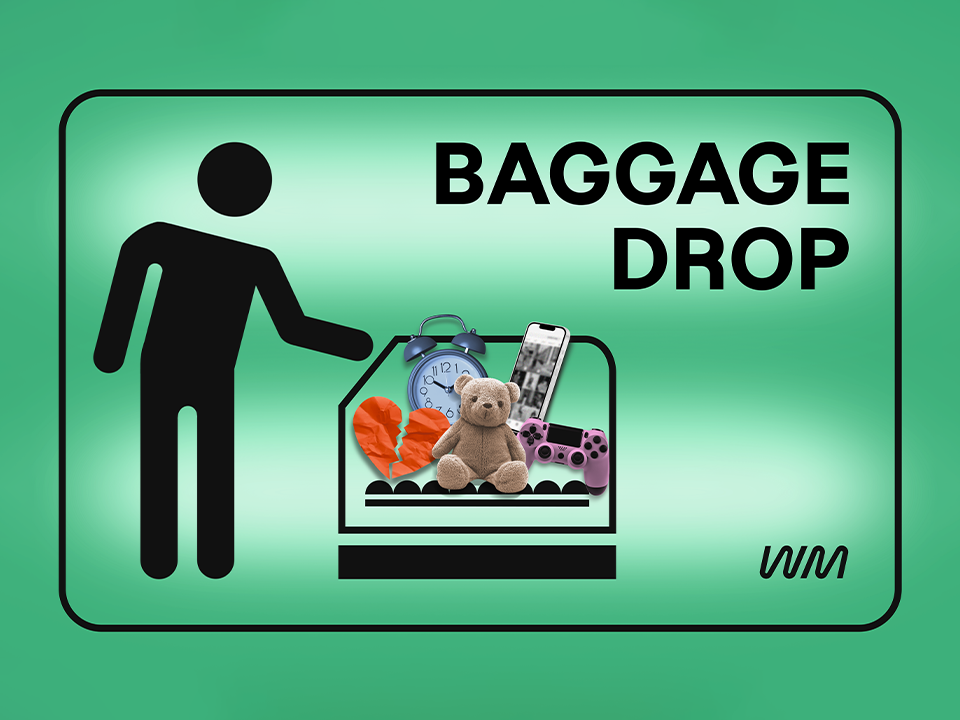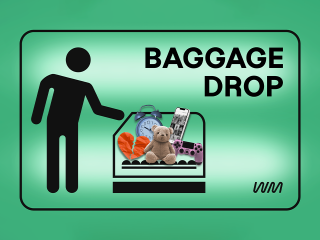Step 7 | Values & Goals: How to Habit Stack


Alo Johnston, LMFT
Licensed marriage and family therapist and writer in Los Angeles, specializing in working with the transgender, queer, and non-monogamous communities
Week three of Baggage Drop begins with host and member of the Wondermind Advisory Committee Alo Johnston, LMFT guiding listeners on a deep dive about habits—helping changes feel more attainable and more impactful. This episode covers the ins and outs of productivity and motivation during periods of personal growth.
Download the How to Break Through Roadblocks worksheet!
Learn more about Alo Johnston, LMFT
Check out Alo’s book Am I Trans Enough?
Research on psychologist Donald O. Hebb
(BAGGAGE DROP THEME BEGINS)
ALO JOHNSTON, LMFT, HOST: Hey, Baggage Droppers—from week one to now, we've explored ways baggage can be anything that holds someone back. We also learned how relational support boosts growth, and this week we're getting into the weeds of forming healthy habits.
My name is Alo Johnston. I'm a licensed marriage and family therapist, a member of the Wondermind Advisory Committee, and I'll be hosting week three of Baggage Drop. The team at Wondermind created this show to give you the tools to get rid of whatever's weighing you down so that you can reach higher heights with your mental health. You might get more out of it if you circle back to previous weeks, but no pressure. You can always start with me today.
(MUSIC BEGINS)
This week we're headed deeper into the techniques and mindset adjustments that you've already begun exploring. We'll start integrating your support system so you can reevaluate ways to keep momentum up as you forge ahead with your changes.
Now, we've all heard it takes 21 days to begin a new habit, but some experts say it actually takes two months or even up to a year—and yet my horoscope says I'm incapable of change. So that timeline remains debatable.
But regardless of how long it takes, one new habit fact is undeniable: neurons that fire together, wire together. In addition to being a great rhyme, the scientific truth behind this is clear: when you ditch old, unhelpful habits, (i.e. drop your baggage) you make the space to create new habits and new neural links. And here's the gold: associating those new habits with something you already do helps you keep your changes going. And just like we learned from week one's episode about motivation, we want our intentions to start internally. That means no “should” statements.
One of the easiest ways to know when your standards begin from outside yourself is when you find yourself saying, “should.”
Things like, I should exercise more. This should be easier for me. Alo should stop listing these examples, but why should I? Because someone else said so? And that brings me back to the key way to understand if your goals match your values.
In week one, Dr. Stern prompted you to ask yourself “why?” Now look at the efforts you've made towards growth or any new habits that you may have started and check in. Does any of this align with my why? Make sure that “why” has an answer. It'll help you avoid the impulse to give up on your goals. For some more inspiration, let's revisit some other Wondermind community's favorite daily habits and why:
[VOICE CLIP 1]: My favorite daily habit would be waking up, getting a cup of coffee while listening to a podcast even if it's just for a few minutes, maybe petting my cat a little because he comes over and it kind of just sets my tone for my day.
[VOICE CLIP 2]: My favorite daily habit is to, after a long day of work, I would take a warm shower and make sure that that's the last thing I do. So after that, no looking at my phone, no nothing. I let everything go and then I'm ready for bed.
[VOICE CLIP 3]: My three favorite habits are to, one, start the day off with a good cup of coffee. If it's possible, I do it outside and just take a moment to be there and to visualize the day I have ahead of me and everything I have to be grateful for. The second is to just stand in front of the mirror for 15 minutes, dancing to my favorite music, which gives me a lot of positive feelings. And the third is to finish off every single day with a warm shower or a nice meditation to just calm down and reflecting over the day I've had.
[VOICE CLIP 4]: My favorite daily habit is walking first thing in the morning and clearing my mind. Usually I do a walking meditation or listen to a podcast about mental health.
(MUSIC BEGINS)
JOHNSTON: But for most of us, even if the habit we want to achieve matches our values—breaking a bad habit and replacing it with a good habit is hard. We talked to Wondermind Advisory Committee member and psychotherapist John Tsilimparis and here's what he said the science tells us about that.
JOHN TSILIMPARIS, MFT: You know, habits are, as you know, very difficult to break. And we're very attached to them. And human beings are creatures of habit. So experts tell us that sticking to routines, habits, and rituals, and performing repetitive tasks helps us predict the future more accurately. That sounds a little weird, but it's true. Predicting the immediate future has obvious benefits because by engaging in this type of statistical foreshadowing over the ages, we have learned to cushion ourselves from potential dangers.
Remember, nobody does anything all the time for no reason at all. Anything that you do on a regular basis gives you a little bit of a benefit. Even the foods that you eat. Maybe you'll sometimes eat foods that you don't like, but only because you think they're good for you. You won't eat them all the time. So, excessive worry, for example, is the same thing. Addiction is the same thing. Nobody uses for no reason at all. They use it because it relaxes them, or it gets them through the day, or it helps with their boredom. So, all behaviors are difficult to break if we've been doing them for a long time consistently.
JOHNSTON: But that’s breaking old habits. What about forming new, healthy habits? While there’s a lot of techniques for that—which John will tell us more about in a moment—it is first important to get into the right mindset. It is important to remember that when you are changing a behavior, it is about progress NOT perfection.
Many of us—me included—fall into a pattern of thinking in all-or-nothing terms about forming new habits. And because of this—there’s often a lot of shame attached when we don’t meet this high expectation we’ve set for ourselves. But when we take a process-oriented approach instead—when we accept that there’s going to be small steps to things—there’s no such thing as failure anymore. There’s just varying levels of success. It is a game of inches—not an all-or-nothing approach. Here’s one process-oriented technique that John recommends for forming new habits. In fact, maybe you’ve even heard about it. It is called habit stacking. But what exactly is habit stacking? And is it the same as multitasking? Here’s John to unpack it for us.
(MUSIC BEGINS)
TSILIMPARIS: Habit stacking is strategically inserting a new behavior into an already existing, current, and maybe reliable behavior. So habit stacking then helps the new behavior build and piggyback on the already existing neural network. A good example of that is, if I go and I run a lot of errands each day and I go to the store, if one of my habits is I want to exercise more. I might consider trying to put in exercise into the errand. If usually I drive to the errand, and I have somebody go pick it up for me or something like that, I might insert that, you know what, I'm actually going to do a little bit of walking to do the errand. That throws in a little bit of exercise because you're already doing it. Another one is if you want to get exercise, instead of taking the elevator, if you're going up one or two flights, you might take the stairs. So it's little things like that.
It's very effective, and you could call it "multitasking," but we don't want too much multitasking because then somebody gets overly stressed, they get overwhelmed, and then they get nothing done. And then if they have the all-or-nothing thinking, they will beat themselves up for not being perfect. What I say too is, it's like a light switch that you put in the dimmer. You can't be on all the time, because you're not gonna be able to break all the habits that you want today. And you can't be off as a switch because maybe off means you're being neglectful. So I'm saying put in the dimmer switch. Dim down the passion to lose weight immediately and try to be more realistic about it.
JOHNSTON: Wow, that's awesome John. Now, it’s time for our exercise. Let's try habit stacking with the goals you've been developing during Baggage Drop. First, I want you to think about your goal or goals for this month's challenge. Mine is to look at my phone less during my downtime. But one practical barrier for me is my phone is always within reach, tempting me. If I take the habit stacking approach, one thing I always do when I come home is take my coat off, hang it up, and put my bag down. So, piggybacking onto my already existing ritual—I’m also going to try leaving my phone with my bag and coat when I get home, where it isn’t in easy access.
This is just one example of a way to habit stack. Think about ways you can do the same with your own goals. And with each goal, remember, it's always a learning process. Have compassion for yourself if it doesn’t go perfectly. You should be allowed to have trial and error moments. So the final task of this exercise is rating your efforts on a scale of one to 10. That can help you remember which of your habits actually get you closer to your desired outcome.
(BAGGAGE DROP THEME BEGINS)
And that's it! That exercise will help you set up your foundation for habit stacking, but you need to work on those stacks, repeating over time, to really strengthen your neural pathways. Leave Wondermind a quick voicemail at the link in our show notes and share a story about your own neurons that fire together. For example, learning from a language podcast while on your daily walk. ”He practicado cada mañana!” Your contribution might even get featured on our Friday recap. Thanks to all who have left voicemail so far, and thanks for joining me today. Tune back in on Wednesday for our next installment of Baggage Drop.
Credits:
Senior Producer: Marisa Bramwell
Senior Writer: Amy Thompson
Producer: Jennifer Bassett
Producer: Pia Glenn
Audio Engineer: Joel Edinberg
Music: Epidemic Sound
Wondermind does not provide medical advice, diagnoses, or treatment. Any information published on this website orby this brand is not intended as a replacement for medical advice or a substitute for the advice of a professional, and you should not rely on it. Always consult a qualified health or mental health professional with any questions or concerns about your mental health


